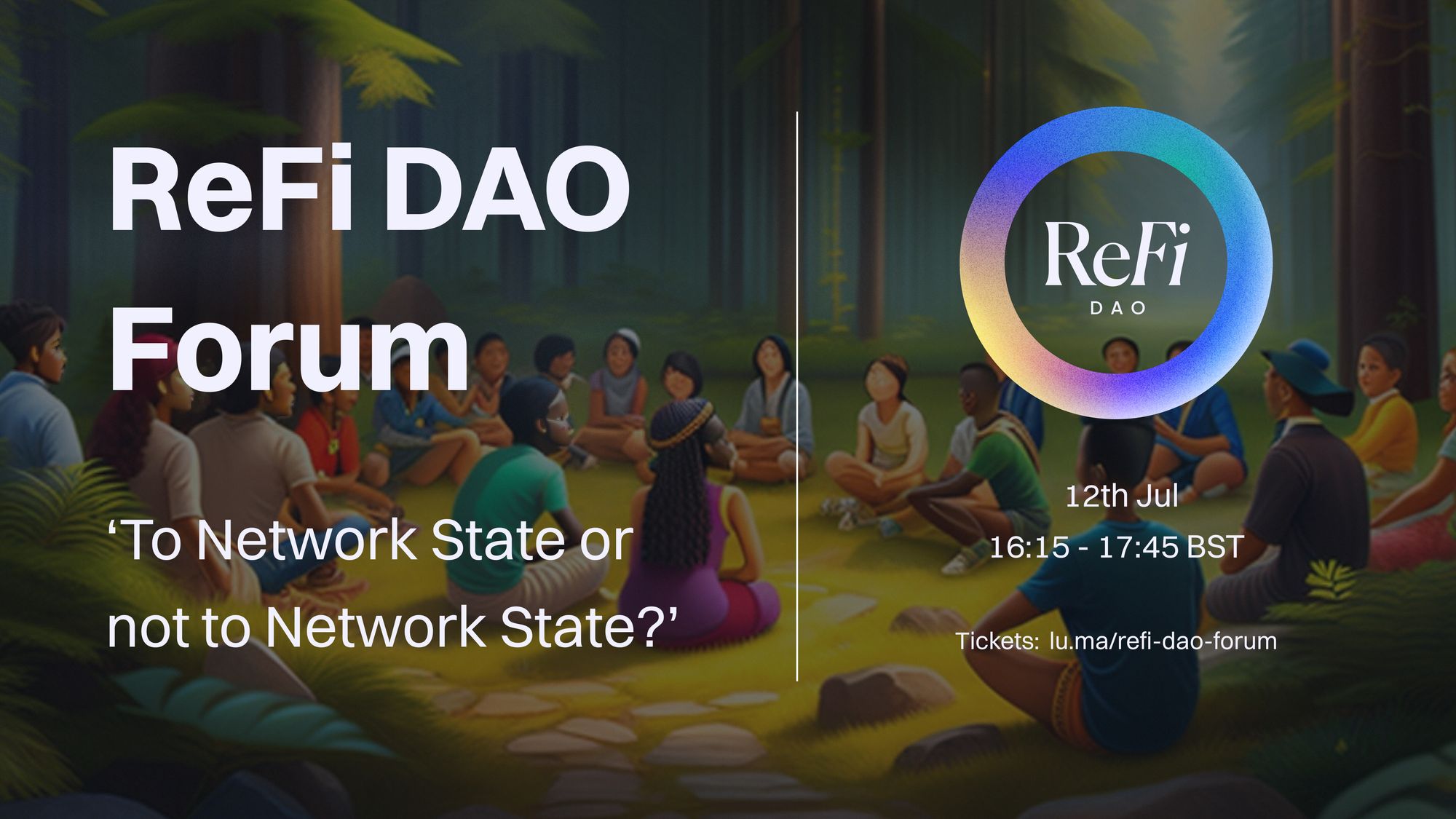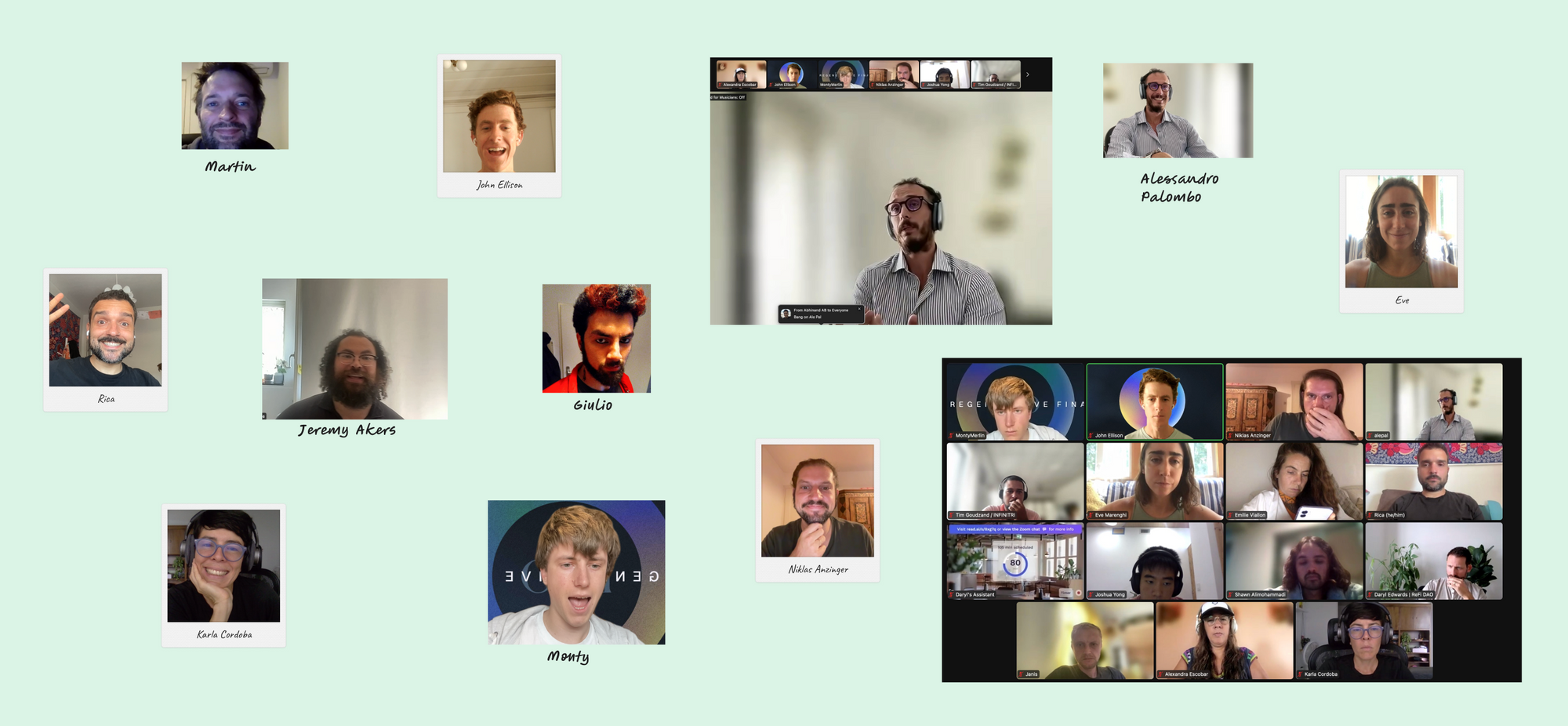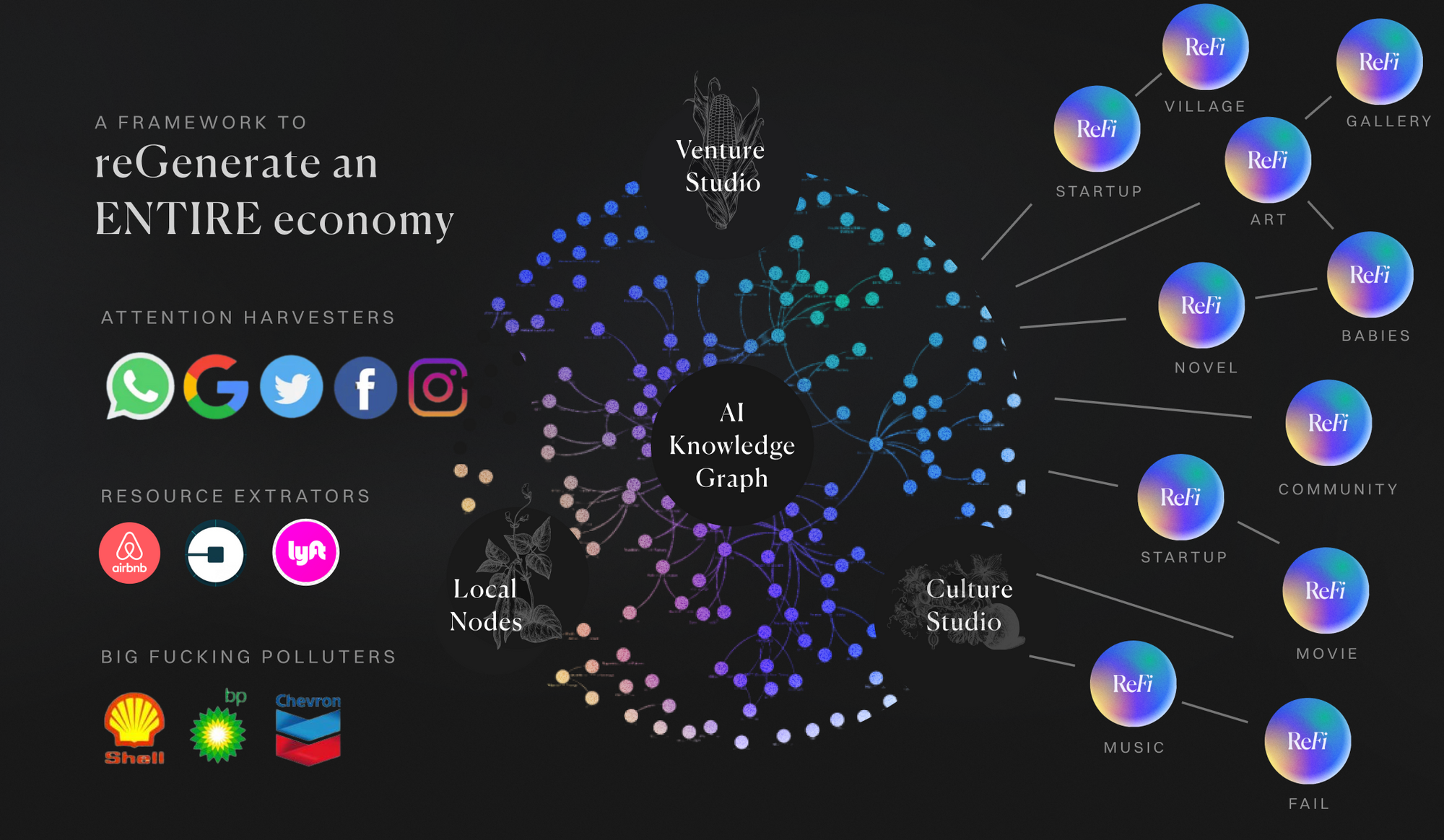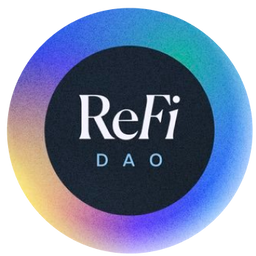To Network State or Not to Network State | ReFi DAO Forum 🗣️
In his controversial book 'The Network State: How To Start a New Country', Balaji Srinivasan set the stage for an engaging clash of ideology & technology. Utilising insights from the ReFi DAO Forum, let's explore this fascinating intersection and imagine a new regenerative paradigm... 🌱
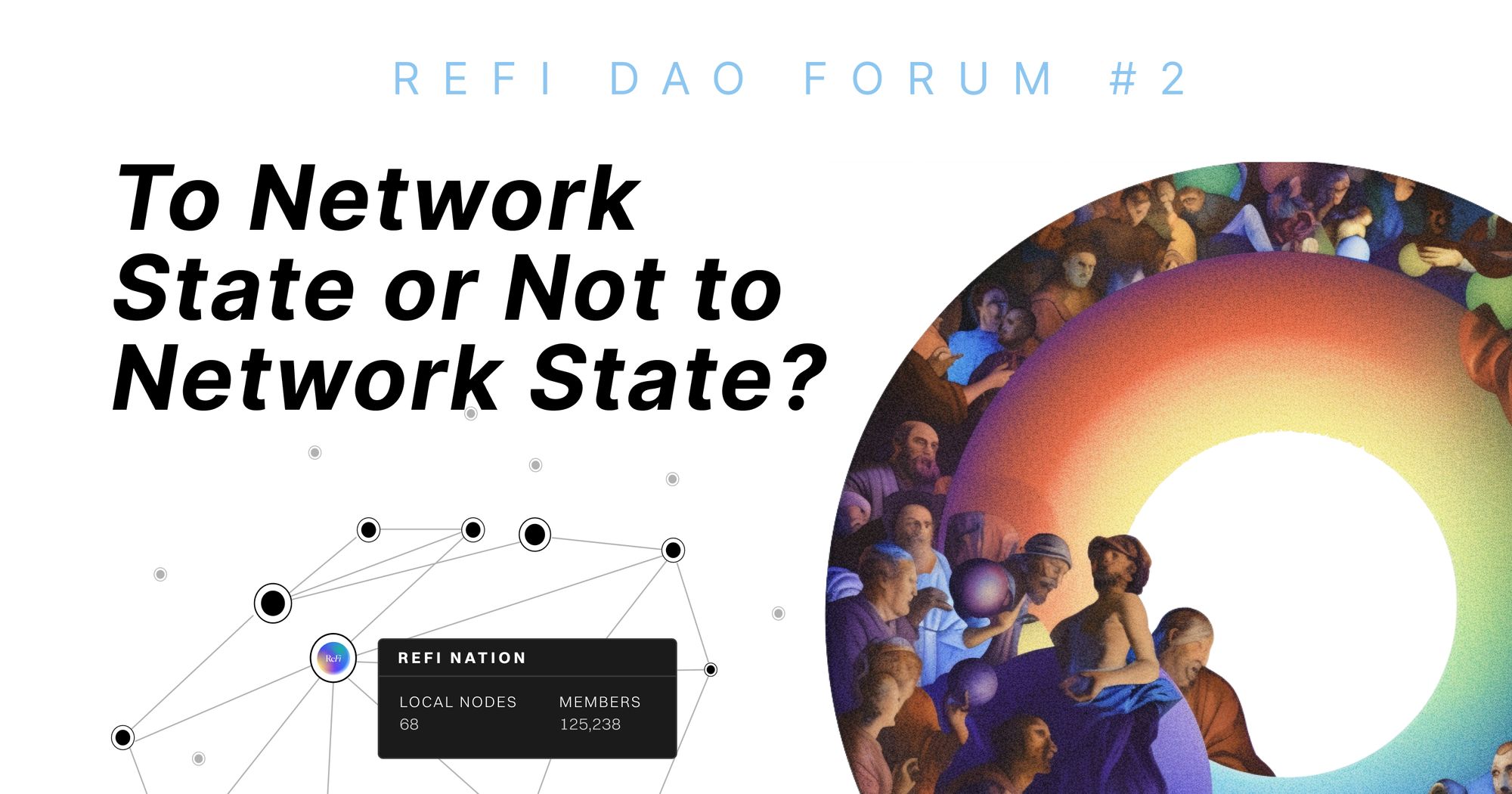
In the ever-evolving world of Web3 & Crypto, one concept has ignited a firestorm of debate and discussion: the Network State. In mid-2022, Balaji Srinivasan - the controversial thinker, investor, and former CTO of Coinbase - introduced the idea in his book, 'The Network State: How To Start a New Country'. In this audacious proposition, he sparked widespread intrigue and a movement of communities and entrepreneurs seeking to build this new type of organisation...
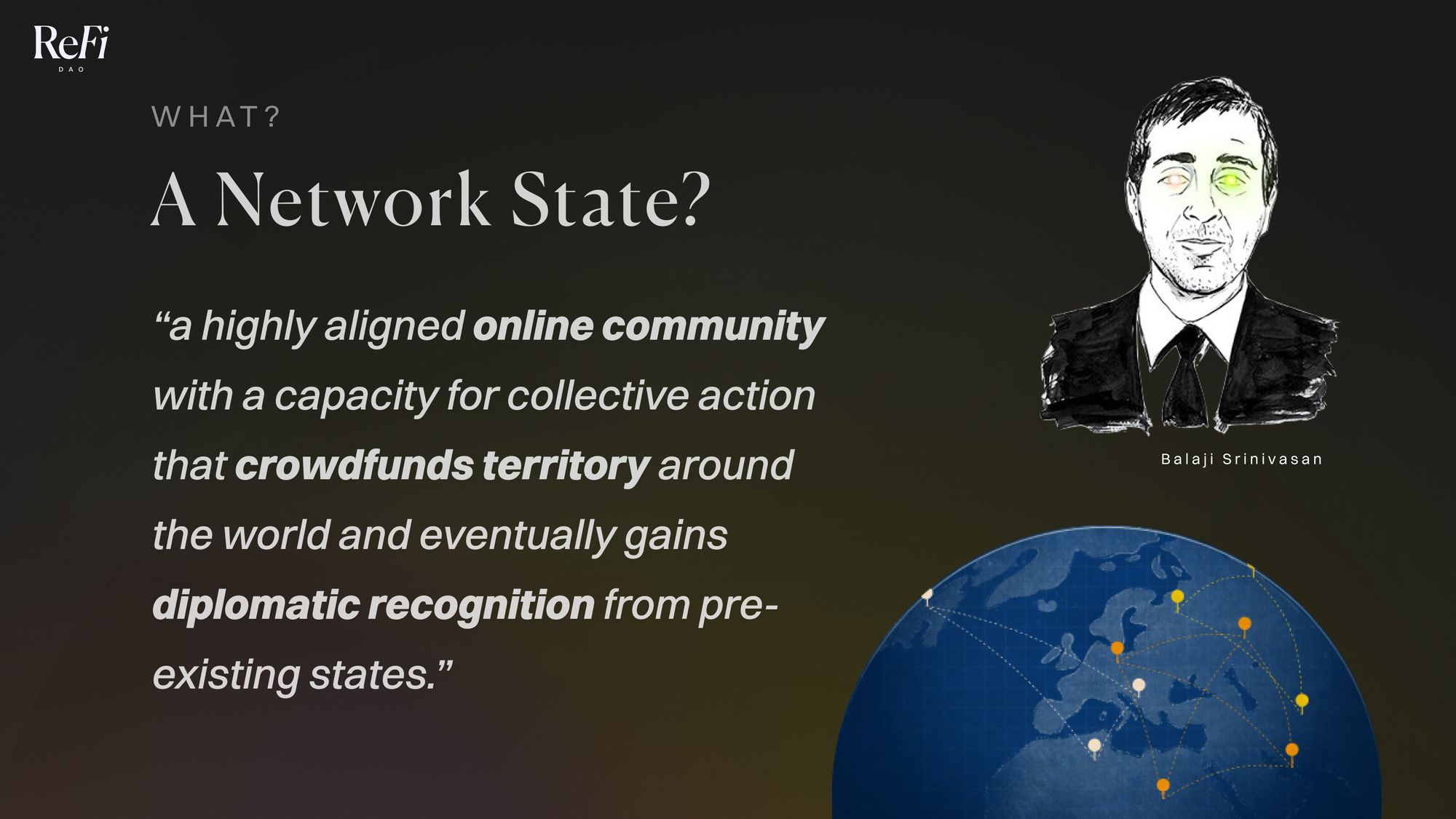
Taking this concept in a new direction, in February 2023 ReFi DAO announced a vision for a network state as a vehicle for planetary regeneration. The model imagined a globally dispersed, but deeply connected organization that takes form as a decentralized network of local startup communities with a mission to catalyze both inner and outer regeneration and pioneer a new paradigm.
The idea was born out of a sobering observation: existing institutions – be they nation-states, corporations, or civil society – have persistently fallen short in tackling the pervasive threats of climate change and other critical challenges of our time. The urgency for a leap in innovation across cultural, social, economic, and technological domains is crystal clear. Driven by this realization, ReFi DAO formulated a mission to bring about a global regenerative economy, fostered by a transformative global network of mission aligned local communities.
Yet despite its allure, the concept of a network state is not without controversy. It has sparked a captivating ideological and political debate, drawing in a wide diversity of perspectives. What exactly constitutes as a network state? Why has it become such a popular meme? What is it that is resonating with so many? And what are the lurking dangers, concerns, risks and critiques?
In this article, we set out to unravel these questions. Drawing upon the enlightening dialogues from the recent ReFi DAO Forum, we will dive deeper into the heart of the network state concept - both its potential and its challenges. From this exploration, we will begin to embark on a journey of discovery and co-creation as we collectively sculpt a new vision for a ReFi DAO powered by and for our community. #RegenCoordiNATION? First, some background... 👇

ReFi DAO's Evolving Organisation
Since 2021, ReFi DAO has been cultivating an ecosystem with hundreds of founders & investors, an online community of thousands, and many dozen of events across the globe. 🌎 🌍 🌏 In this time, with a small core team at the helm, we have been able to build and iterate rapidly, testing new ideas in a live environment while responding to community feedback.

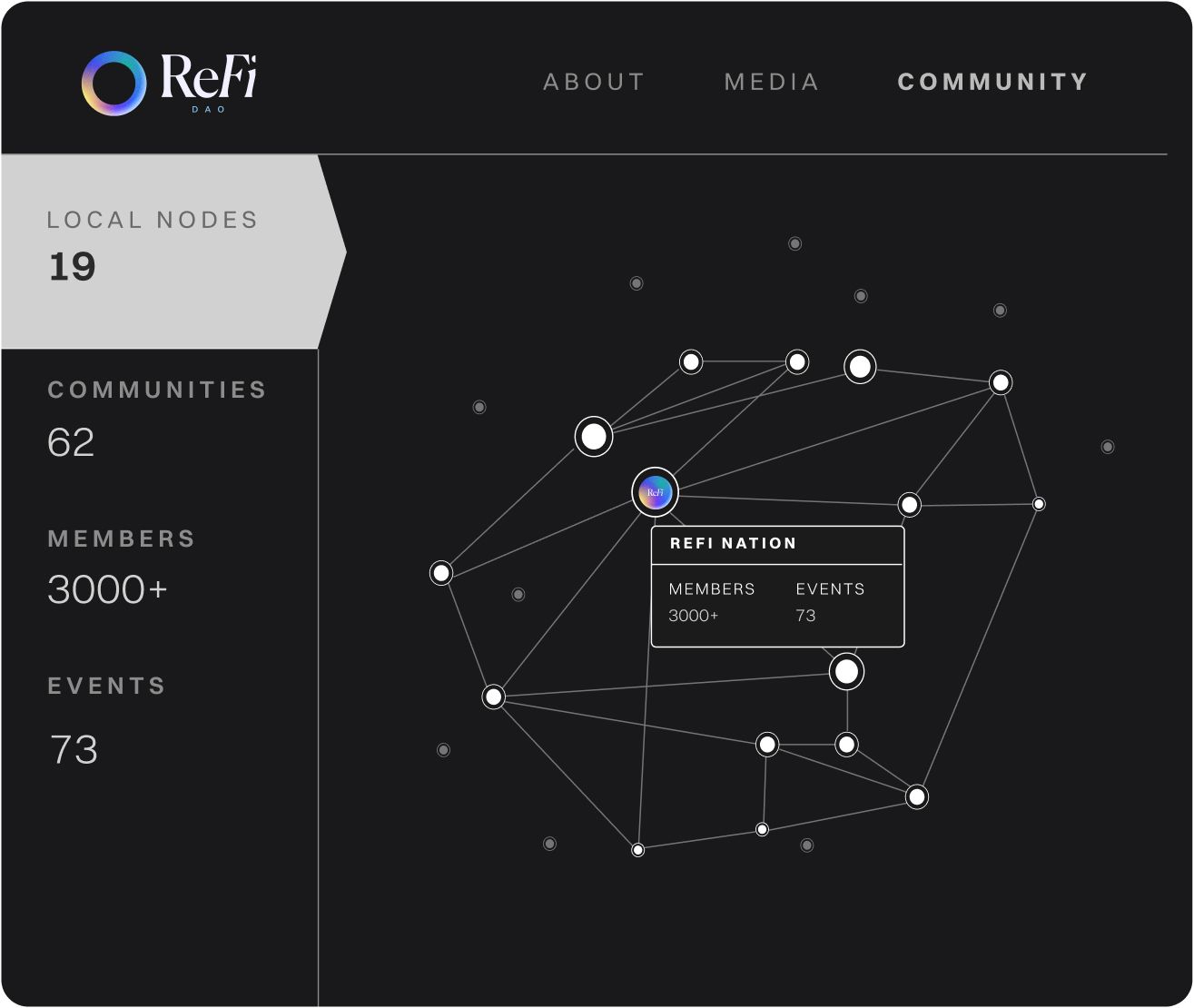
But now, the stakes are higher. With a significant online influence and a growing network of autonomous local communities, we've reached beyond our startup roots. We must transform our governance and organizational structure. We must become a community-first, community-led and community-owned organisation.
With this is mind, ReFi DAO is seeking to embark on a 12 to 24 months journey towards 'Exit-To-Community' where ownership and governance will be distributed to key community members and contributors. This strategy seeks to decentralize wealth and voice across the network rather than concentrating it in a select few, and aims to ensure that the organization is co-owned and co-governed by the community that fuels it in a way that promotes inclusivity, dynamism, and enhances collective capacity.
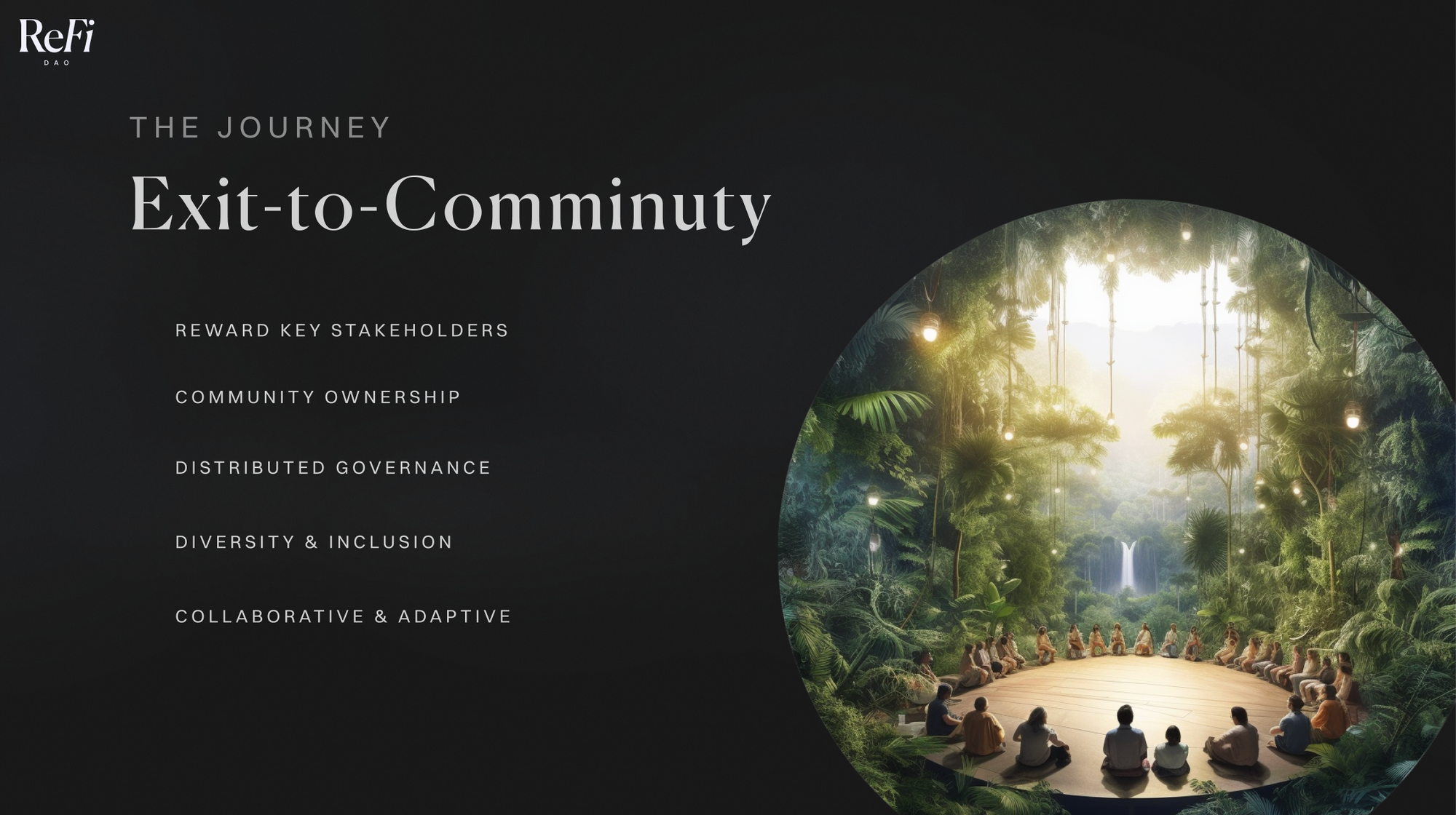
The newly launched ReFi DAO Forum aims to act as a vehicle for this transition. We are inviting a diverse network of ReFi DAO stakeholders, alongside leaders from across the Web3, distributed governance, organizational and monetary policy sectors to help shape the vision and trajectory of ReFi DAO. Taking form in monthly liberating structured workshops, we aim to create space for open discussions, sense-making, and active co-creation, while promoting diversity, inclusivity, and creativity.

Guided by principles from Holacracy and Sociocracy, Androgynous Organisations, Distributed Cooperatives (DisCO), Deep Democracy, and more, the Forum will also act as a mechanism for consent-based governance with core ReFi DAO stakeholders, aiming to surface the community's thoughts, ideas, concerns, and tensions regarding ReFi DAO's actions and proposals.
The first ReFi DAO Forum Meeting kicked off on the 24th May and served as a springboard for the beginning of our community-led sense-making. Among the many insights and action points, there was a wellspring of thoughts and concerns around the idea of Network States, which brought us to our next session...
To Network State or not to Network State? 🌐
Kicking off the second ReFi DAO Forum meeting, a vibrant ensemble of changemakers, innovators, and thinkers from around the globe assembled. Each brought a unique perspective rooted in their diverse cultural backgrounds, professional experiences, and areas of expertise. From Victor Kariuki's work on decentralized science in Kenya, to Mars Robertson's redefining of value from London; Timothy Goudzand' ReFi Leadership in Suriname, to Giulio Quarta's post-capitalist activism across Austria and Spain; Karla Córdoba-Brenes' transformative work on social currencies in Costa Rica, to Matthieu Hayoz's groundbreaking nature-centric app development in Switzerland.
Coming together our aim was to delve into the concept of the Network State - its merits, drawbacks, and proposed alternatives - and dissect ReFi DAOs Initial Network State Draft Hypothesis from Feb16th 2023. Let's dive in to some of the key insights and reflections.. But first, what actually is a network state?
The Short History of Network States...
The innovative but controversial conception of a network state was originally coined by Balaji Srinivasan in mid-2022 within his book, 'The Network State: How To Start a New Country'. Balaji is a well-known entrepreneur and investor, he is the former CTO of Coinbase, co-founder of Earn.com (acquired by Coinbase), and has served as a board member of Andreessen Horowitz, a renowned venture capital firm.
As defined by Balaji, he characterises a network state as the next evolution of nation-states. He envisions them starting with the formation of highly-aligned online community that takes root around a strong shared proposition or 'moral innovation'. Subsequently the community goes on to acquire land or 'territory' in various locations, acting more like a decentralized network than a contiguous piece of land. The idea is based on the convergence of digital platforms and political entities that evolve from online communities based on shared propositions into actual physical states.




Srinivasan compares network states to cryptocurrency's rise to recognition. Cryptocurrency started with numerical significance, gaining traction through increased use and market capitalization, before obtaining societal significance with acceptance and recognition from existing financial institutions (although this has understandably taken a bit of a knock in recent times!). Similarly, a network state could gain numerical significance (population, land ownership, income) and then strive for societal recognition in the form of diplomatic acknowledgment from existing states.

The key innovations that make network states possible, according to Srinivasan, are existing internet & Web3 technologies. They allow for the building of massive online communities, the start of billion-dollar digital currencies, and development of comprehensive global governance and coordination systems. As such, Balaji argues that such network states are already feasible today.
However. Given it's radical departure from traditional concepts of statehood and nation-building, as well as the contentious political nature of the concepts covered, Balaji's proposition has sparked widespread discussion and debate. Network states are still just an idea. It is not something that has ever been done before, and many questions and concerns remain. How would existing nations react to them? Would network states ever actually be acknowledged or receive legitimacy? And regardless of the theoretical feasibility, deeper questions also lurk. Do they represent a new frontier for economic and societal innovation? Or are they an elitist techno-libertarian fantasy with dystopian potential?
Part 1 - Collective Visioning 👀
Before diving into the nuances of network state, to kick-off the Forum we first looked inwards to collectively imagine the future we want to inhabit and what is blocking us from getting there... Here is synthesis of key ideas shared:
How do you envision a better future? What does it look like? How might we get there?
- Regeneration and Decentralized Science (DeSci): Participants imagine a future where regeneration and science play a central role. This extends to digital well-being, land regeneration, and fostering a culture around regenerative ecosystems. Victor Kariuki highlighted the importance of nurturing education in regeneration, science, and web3 technologies. Owen Langham shared his interest in land regeneration and the challenge of including nature in balance sheets.
- Decentralization and Post-Capitalism: There's a call for a shift from traditional economic systems to alternatives that prioritize values, decentralization, and less monetary focus. This includes rethinking societal organization and incentives (Rica Amaral), moving towards a post-capitalist future (Giulio), exploring social currencies and collaborative businesses (Karla), and seeing the potential of decentralization to enact change swiftly and effectively (Martin).
- Community Involvement and Democracy: A more democratic society where individuals have a continuous voice, not just during elections, is desired. Daryl Edwards focused on community contributions and meaningful collective action. Giulio envisions a future of solidarity, democracy, beauty, and abundance.
- High-Tech but High-Life: Several participants voiced support for the solarpunk movement, which combines a positive vision of the future, environmental sustainability, and the use of technology for the common good.





These themes provide a vision for a future that's regenerative, democratic, harmonious, conscious, decentralized, innovative, empowering, and inclusive. But what is blocking us from getting there?
Where and how are current institutions, nation states and global systems failing us?
- Value Misalignment: Mars highlighted how current systems fail to account for costs externalized to the future and nature, leading to a crisis. There is a lack of value placed on essential resources like clean air, rivers and abundant nature. Monty also spoke about the need to redesign economic systems, calling for innovations in regenerative finance and the commons.
- Short-term Focus and Externalized Costs: Daryl pointed out that institutions fail in long-term planning and valuing future generations. There is also the issue of systemic drive for unsustainable growth, lack of global coordination, and lack of accountability - especially of international agreements.
- Inequality & Exclusivity: Rica emphasized that current systems are not optimized for everyone and are instead being created by an elite to benefit the elite. These systems often lack local orientation and homogenize groups, voices, and dreams.
- Inadequate Institutions: Jeremy Akers mentioned how legacy institutions are built for the past and are ill-equipped to deal with the complexities of the modern world. He highlighted problems with centralization, institutional monoculture, and the lack of diversity, representation, and adaptability.
These points provide an overview of the perceived failures of current systems. They highlight the need for systemic change, decentralization, redefining value, and improved representation and diversity in decision-making processes. The challenge lies in creating systems that can address these issues while remaining resonant and adaptable to the ever-changing complexities of the modern world...
Part 2 - Network States... 🌐
Given the future that is being envisioned and some of the current blockers preventing us from getting there, we then dived into the world of network states to begin evaluating their applicability and dangers as a potential solution... Here is a synthesis of some key ideas shared:
What are the attractive and exciting ideas surrounding the concept of a network state?
- Voluntary Participation and Mobility: As Alessandro Palombo and Niklas Anzinger emphasized, Network States (NS) enable individuals to participate freely and leave at any moment. This flexibility promotes competition and innovation among different NS models. It also aligns with the idea of "voluntary association" that Joshua Yong mentions.
- Innovation Catalyst Amidst System Failures: As recognized by John Ellison, Monty, Alessandro, and Raam Chandrasekharan, Network States present an opportunity for innovation in governance and institutions, acknowledging current systems' shortcomings. The potential for redefining state organization, fostering legal and regulatory innovation, and experimenting with alternative governance forms are seen as key opportunities offered by NS.
- Value-Driven and Collective Empowerment: Karla and Rica mention the attractiveness of a state or network built on shared values, rather than geographic location. This sentiment is echoed by Tereza Bízková and Shawn Alimohammadi who highlight the idea of how an aligned community around a shared cause could facilitate collective action, and empower citizens to pioneer new forms of socio-ecological activism while promoting faster deployment and enhanced coordination.
- Environmental Regeneration: Sandra Ponce de León and John bring forth the idea of environmental regeneration and harmonious co-existence with the Earth. They suggest NS can play a significant role in this process by crowdfunding nature regeneration projects and redesigning the money system to be more regenerative.
The overall consensus seems to be that NS offer an opportunity for radical innovation in governance and social organization, fuelled by decentralization, voluntary participation, technological advancements, and community alignment around shared values and goals.

What are the dangers, concerns, or risks surrounding the concept of a network state?
- Exclusion and Inequality: Joshua, Tim, Shawn, and Raam articulated concerns that Network States might inadvertently exacerbate socio-economic inequalities through exclusion of certain societal groups, wealth concentration, and accessibility challenges in emerging economies. Coupled with potential cultural, linguistic, and physical barriers, as well as risks of nationalist or anti-foreign bias, these could lead to neo-colonial practices & conflict unless local stakeholders are actively included.
- Conflict and Abuse: Tereza, Monty, and Daryl were also concerned about the potential for conflict, both within network states and with existing nation states. They worried about governance issues, extraction, and the potential for network states to replicate problems found in traditional systems. Monty, in particular, highlighted the dangers of creating competitive exit-based states that are likely to further perpetuate dynamics of rivalry and conflict.
- Legitimacy and Recognition: Sandra, Karla, Giulio, and Martin expressed skepticism about whether network states could ever gain diplomatic recognition or legitimacy. They also questioned the focus on this goal, suggesting that it could be naive and unrealistic.
- Critique of the Underlying Philosophy: Several respondents including Raam, Claudio, and Monty also expressed doubts about the philosophical underpinnings of network states and the underlying ideology of Balaji. They were skeptical of the focus on exit over engagement, the potential for falling back into extractive dynamics, and the risk of network states being a meme that is propagated by masculine-centric and egotistical elites.
In general, while the respondents recognized the innovative potential of network states, they also cautioned against rushing into the concept without thoroughly examining its implications and potential risks. They advocated for careful consideration of issues like inequality, exclusion, conflict, and governance, and they emphasized the importance of community, inclusivity, and engagement over the pursuit of independence and diplomatic recognition.
Part 3 - A ReFi Network State? 🌱
Now that we had explored both the potential and the concerns around the network state concept, we then embarked on an exercise to collectively scrutinise the original draft proposal written in February 2022 of forming a ReFi Network State. This document is out of date, but you can read the full proposal for yourself, or see some of the slides below for a highlight of key ideas...
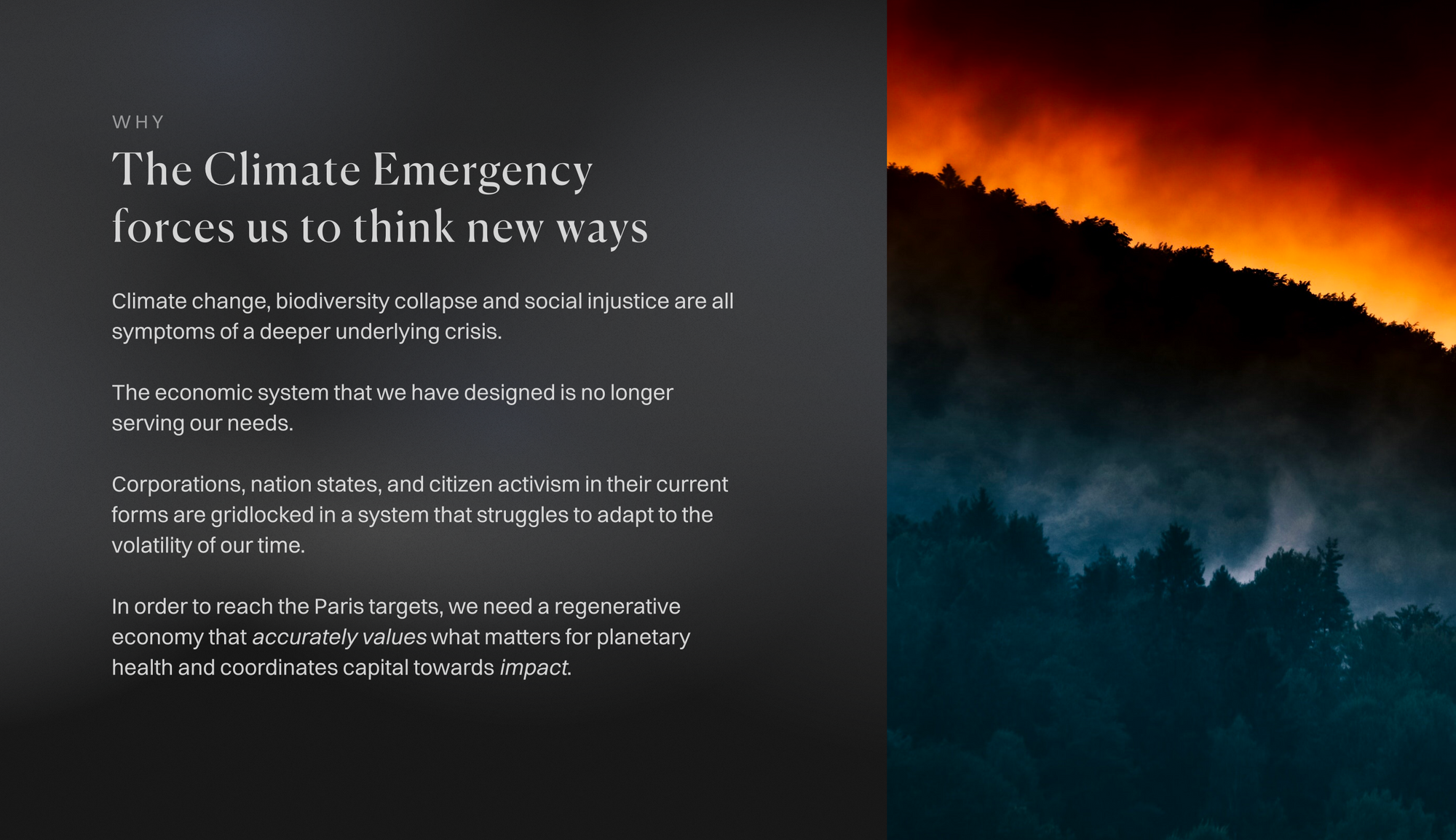
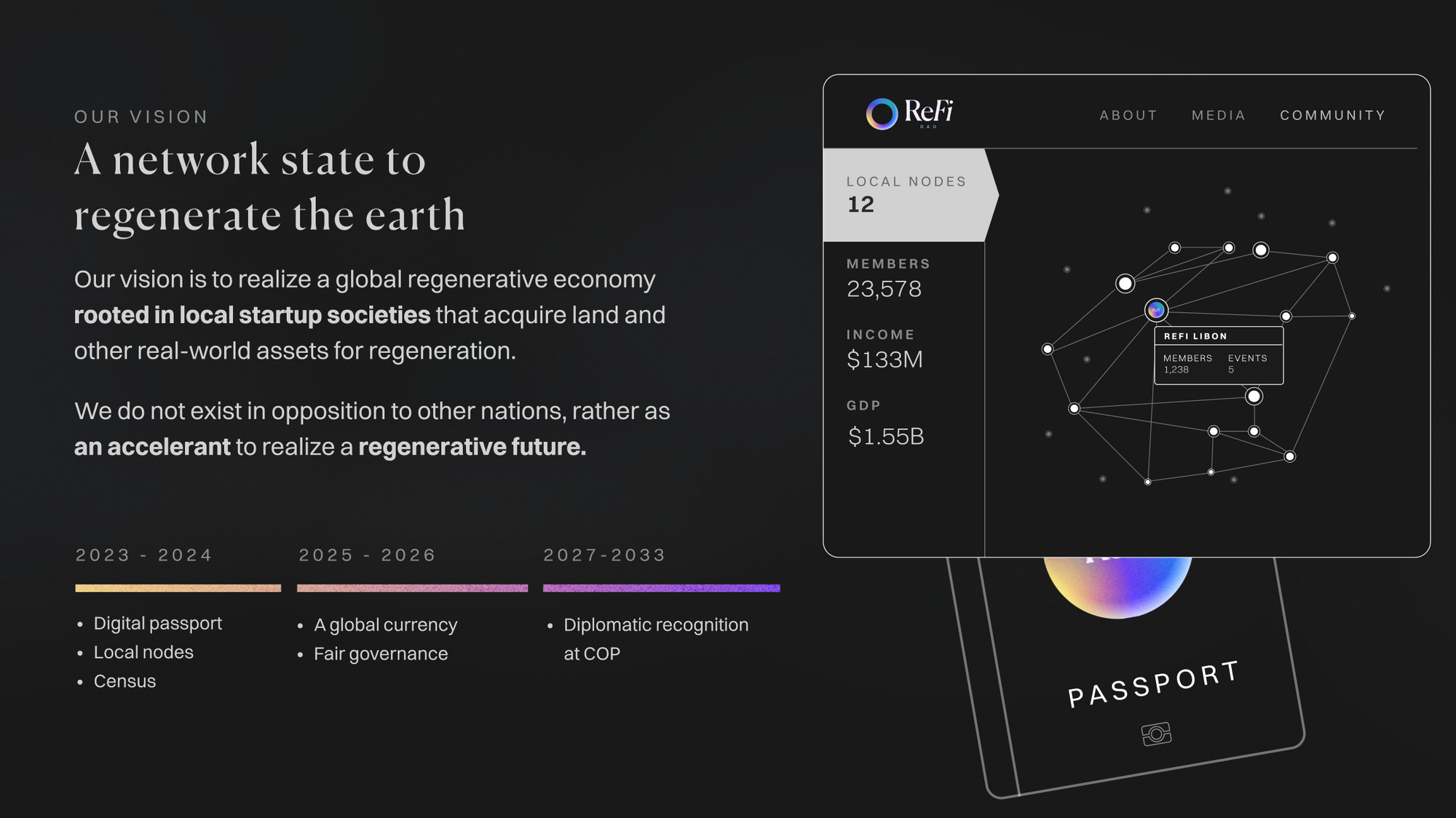
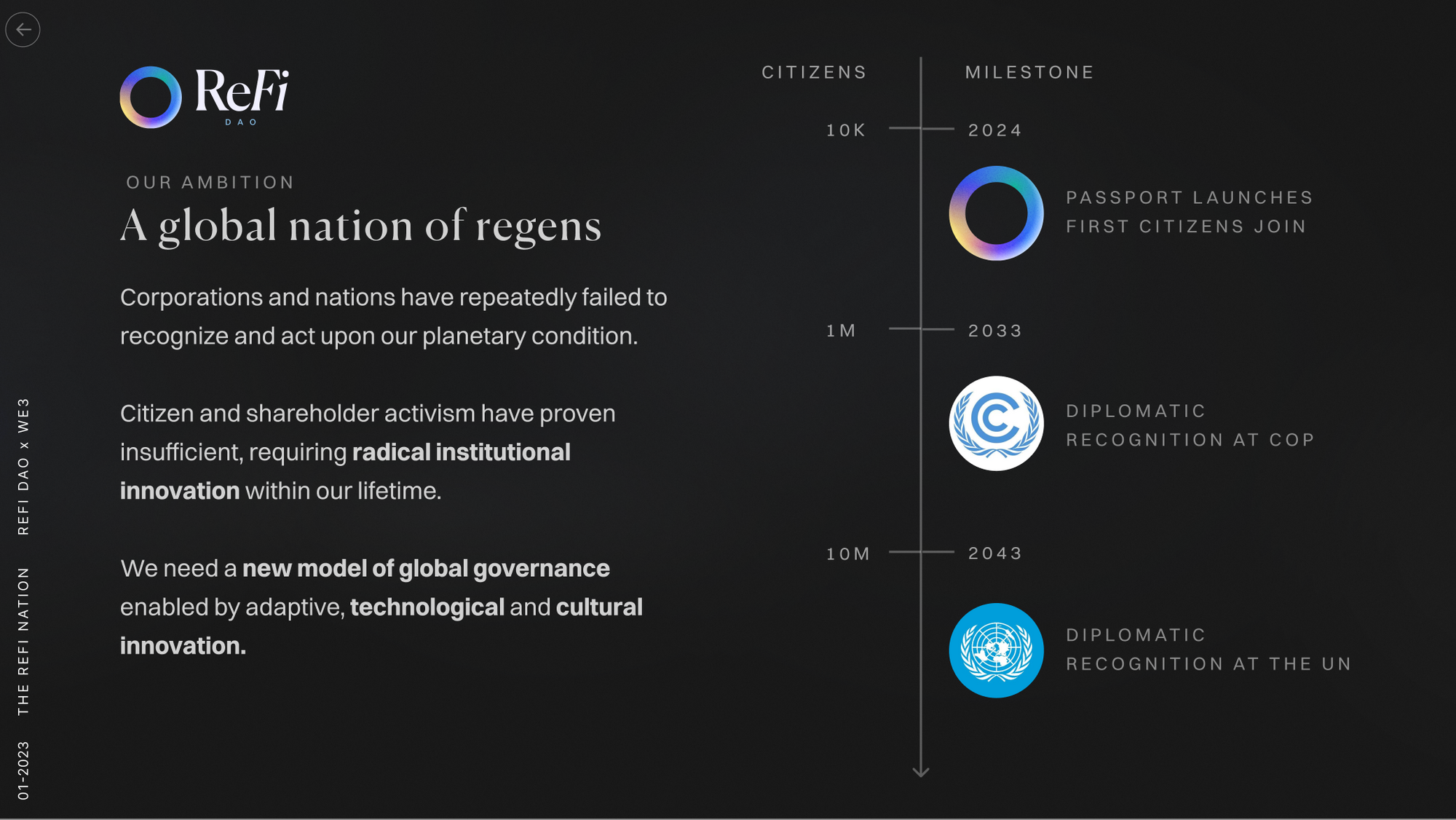
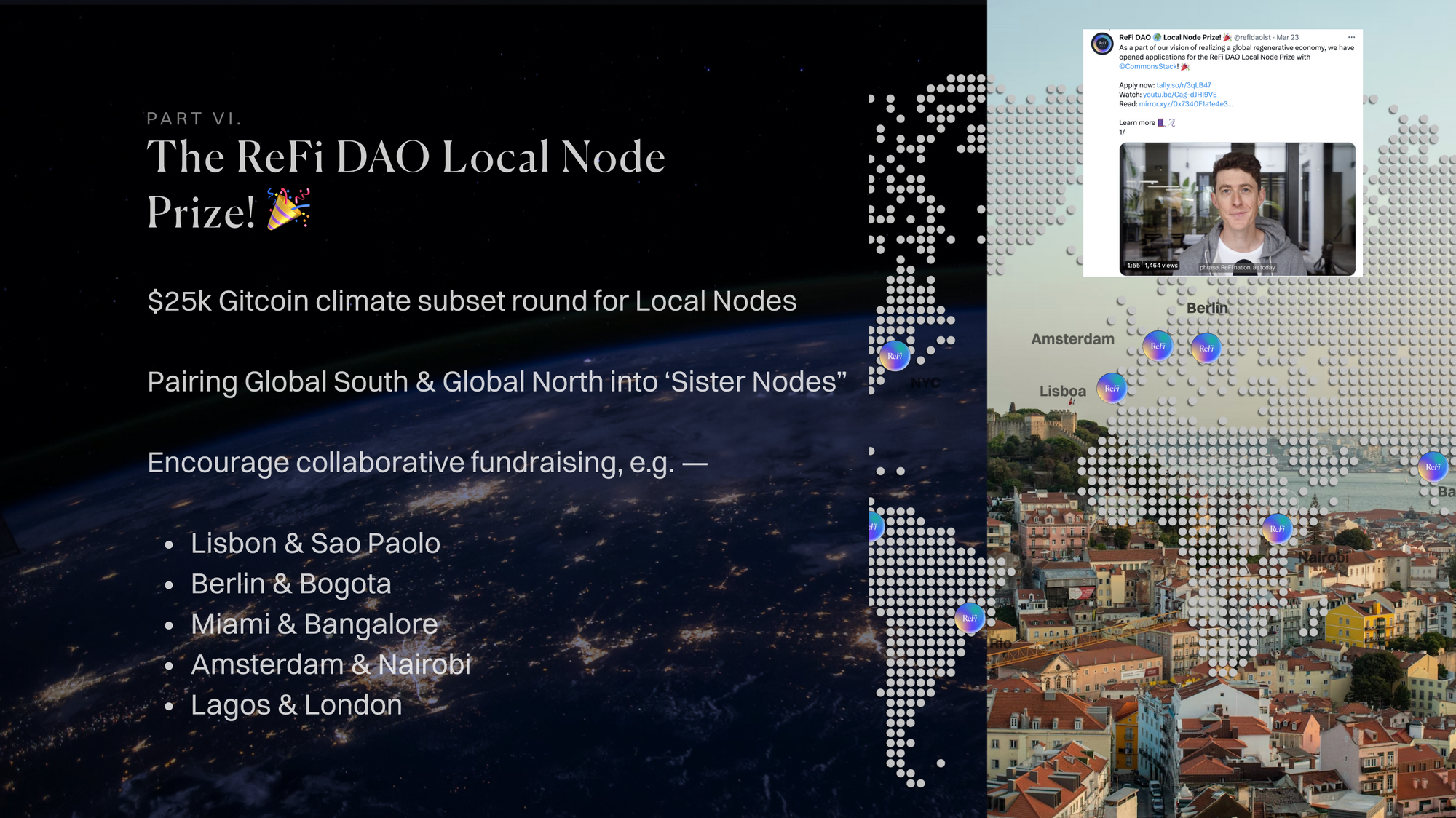
During the Forum workshop, many vibrant ideas, suggestions, and critiques were shared on the proposal; The need to re-define and re-envision is clear. But to what conceptual frameworks and models should we look towards? How should we evolve a new roadmap and whitepaper for ReFi DAO?
Part 4 - The Rise of Coordi-nations... 🙏
For the final stage of our workshop we started to explore alternative models for network-state-like organizations, turning our attention to the concept of 'Coordi-nations' - a term recently introduced by Primavera de Filippi of BlockchainGov and Josh from the Blockchain Socialist in their podcast series titled 'Overthrowing the Network State'.

Traditional nation-states, tied by geographical boundaries and legacy infrastructures, often fail to keep pace with the rapid transformations ushered in by networked communication and globalization. Their institutional inertia hampers their ability to effectively address increasingly complex global issues. It is here that Coordi-nations come into play as an innovative response to these challenges.
Coordi-nations offer a new institutional structure for global cooperation that leverages the inherent potential of digital communities and modern information technologies to tackle global coordination challenges.

What sets Coordi-nations apart from traditional nations, even from the concept of the Network State proposed by Balaji, is their emphasis on voluntary association, shared values, and mutualism rather than territorial limitations. Their sovereignty is carved out in the digital sphere, and grounded in participatory governance and decentralized decision-making. Individuals can be members of multiple Coordi-nations, fostering a rich landscape of co-existing identity.
Forum Conclusion & Key Action Points 🎬
So considering the awesome foundations of Coordi-nations and acting on the collective insights & intelligence generated from this vibrant Forum session - What is next? Here is a summary of the strategically most important next steps for ReFi DAO to address and act upon:
- Reframing the Concept: There is a clear need to move away from the term 'network state,' which has been identified as potentially problematic due to its inherent and divisive political and ideological implications. Instead, terms like 'coordi-nation,' 'network society,' or 'startup society' are suggested as more fitting. The team needs to steer discussions and actions towards these more cooperative, regenerative, and inclusive terminologies that reflect the essence of what ReFi DAO is actually aiming to build.
- Shifting Focus away from National Sovereignty and Diplomatic Recognition: Based on the insights and feedback from the session, there seems to be a consensus that striving for national sovereignty and diplomatic recognition might not be the most pragmatic or desirable route for ReFi DAO. The core team needs to shift its focus away from these political objectives towards building on the powerful network organization that ReFi DAO already represents.
- Building on Existing Strengths & be Collaborative: Rather than seeking to form a sovereign state, ReFi DAO should aim to work as a partner alongside existing nations and institutions, potentially taking on a more integrated political role. Emphasizing the significance of community engagement and local-first approaches, the organization should build a sustainable and distributed value chain that centers on local communities and end-users.
- Facilitate Inclusive Community Dialogue and Effective Governance: ReFi DAO should continue engaging the community in robust discussions and decision making processes to ensure the actions and outcomes align with the community's needs. Moreover, the organization should further develop clear, fair, efficient and more formalized governance systems which could encompass community proposal systems, community voting, and the potential formation of a ReFi DAO Council or Committee. This evolving organizational and governance design should enable progressive decentralization and empower wider community participation and contributions.
Overall, the forum was a true testament to the power of collective intelligence and shared passion in action. Although participants represented a broad array of organizations, initiatives and perspectives, from ReFi DAO Nodes and Network State advocates, to Crypto Commons Association and The Blockchain Socialist, they were united by a common thread: an unwavering commitment to exploring and shaping the future of decentralized, regenerative systems for a more sustainable and equitable world. Their collective efforts underscore the fact that when diverse minds come together, truly transformative ideas can emerge...
A Regen Coordi-Nation? 💡
How can ReFi DAO maximise it's impact? How can we catalyse and pioneer a new regenerative paradigm. Check out some of the exciting ideas in the works below 👇
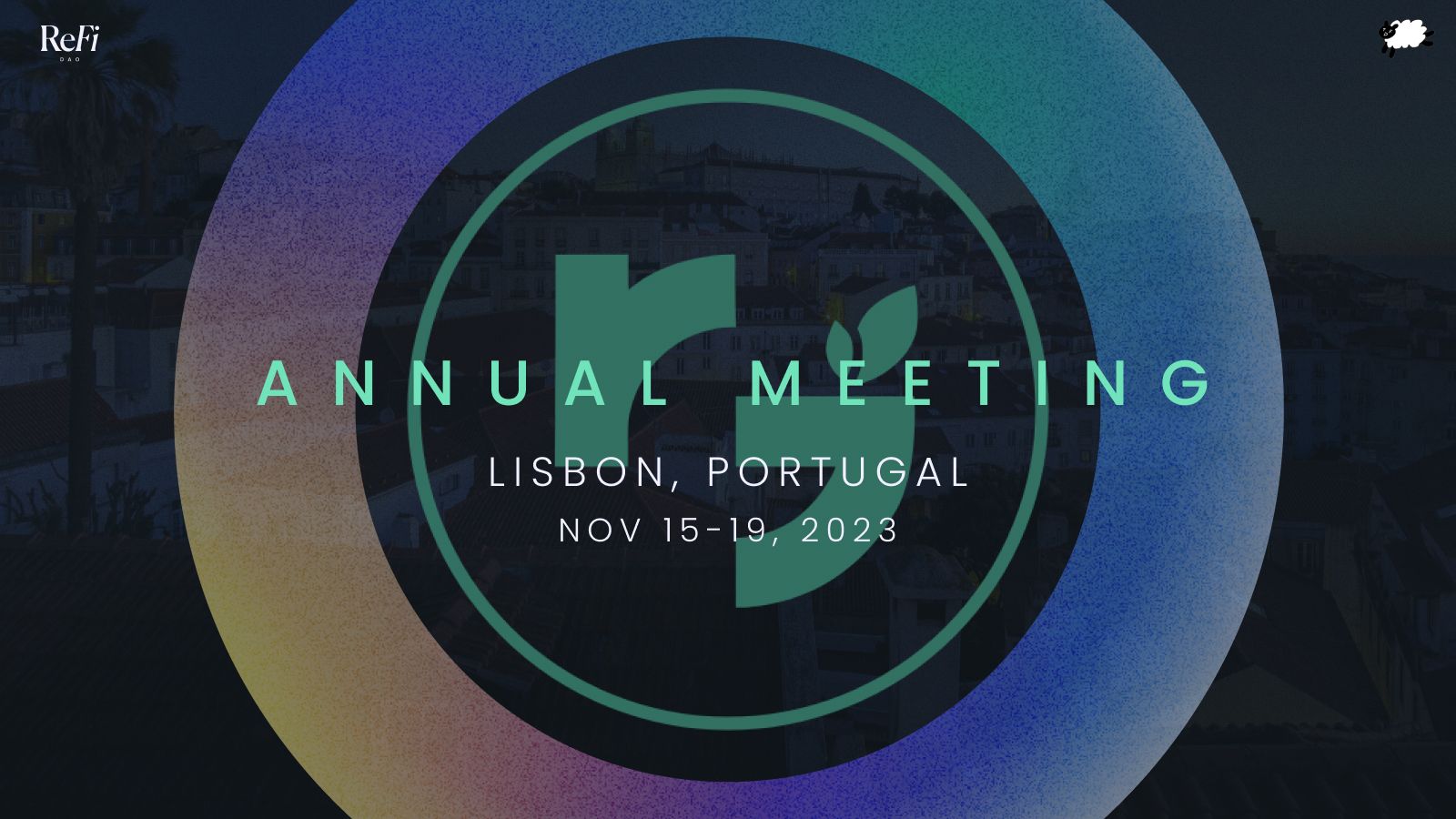
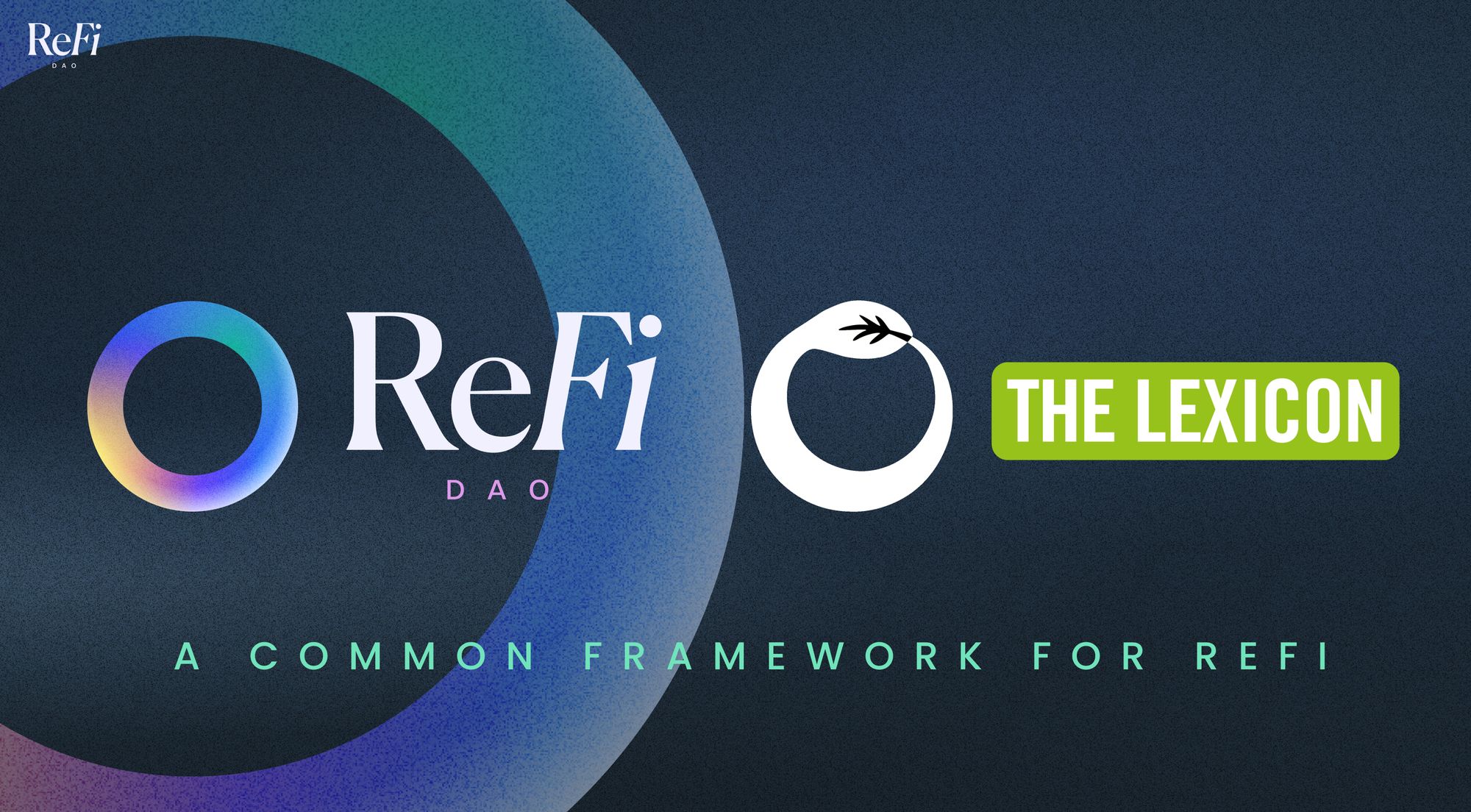
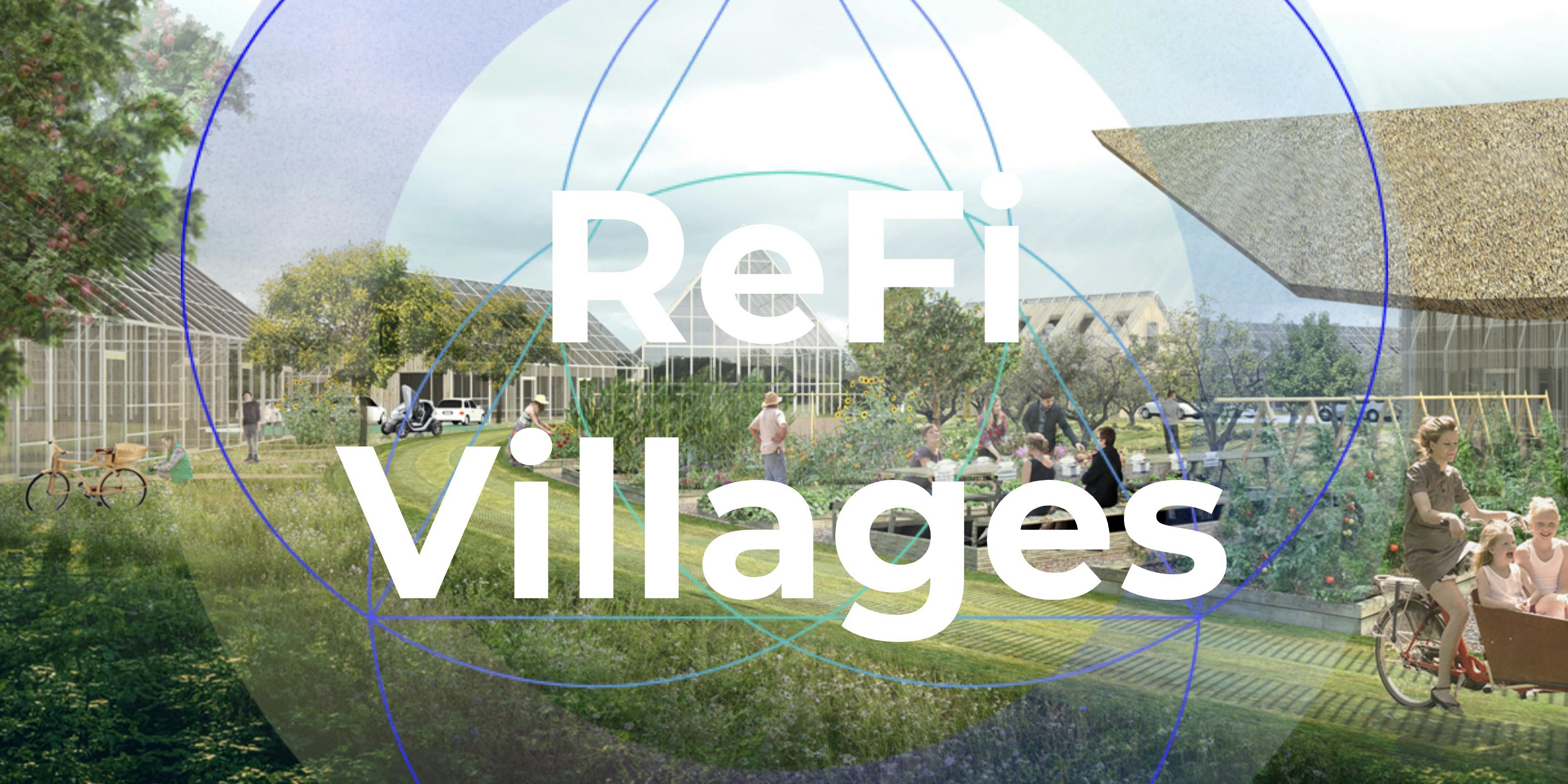
But we can't do it alone.
In the midst of a bear market and the valley of despair: What if instead of adopting scarcity thinking, we embraced a mindset of collaboration and abundance? What if the believers and committed Regens banded together? What if we formed a global Regen Coordi-NATION?

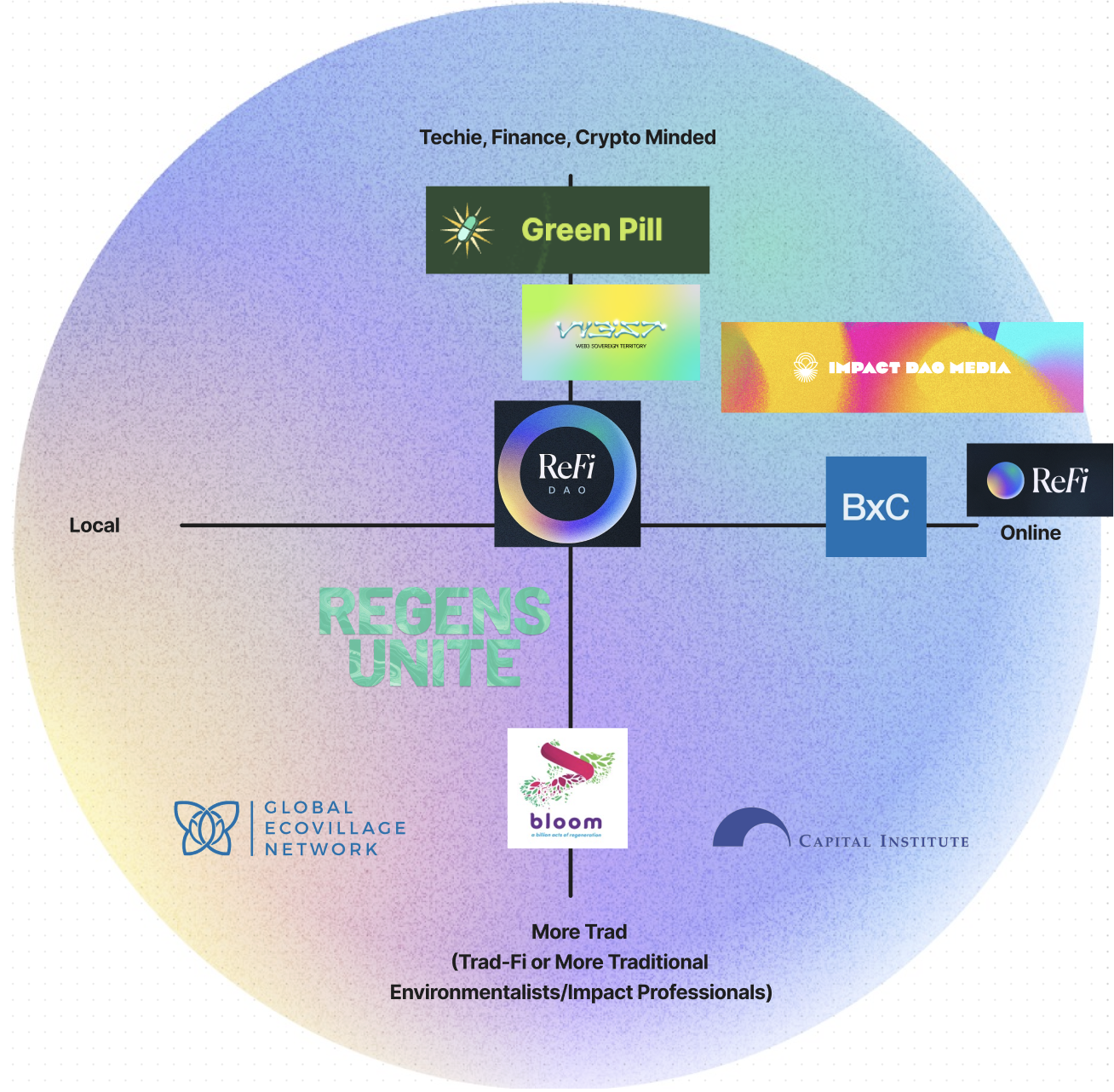
From ReFi DAO to GreenPill Network to Regens Unite and others, each of our communities share common overlapping values, missions and identities. Yet at the same time, each has a unique proposition, unique audience, and unique resources & capabilities. How might we leverage these individual strengthens and collectively coordinate for the combined good of the regen agenda? What if we were to enact what Web3 was actually meant to unlock? COORDINATION. LFG 🌱🌱🌱


Let's finish this article with an open-ended question and call to action - What is ReFi DAO? What does it mean to you? Here was the response from Karla of ReFi Costa Rica:
We are a collective of ReFi leaders and enthusiasts... organized locally and interconnected globally... what could emerge from that? lets find out... :)
Let us know your answer to this question @ReFiDAOist and we would be super grateful if you might share this post with your network 💚
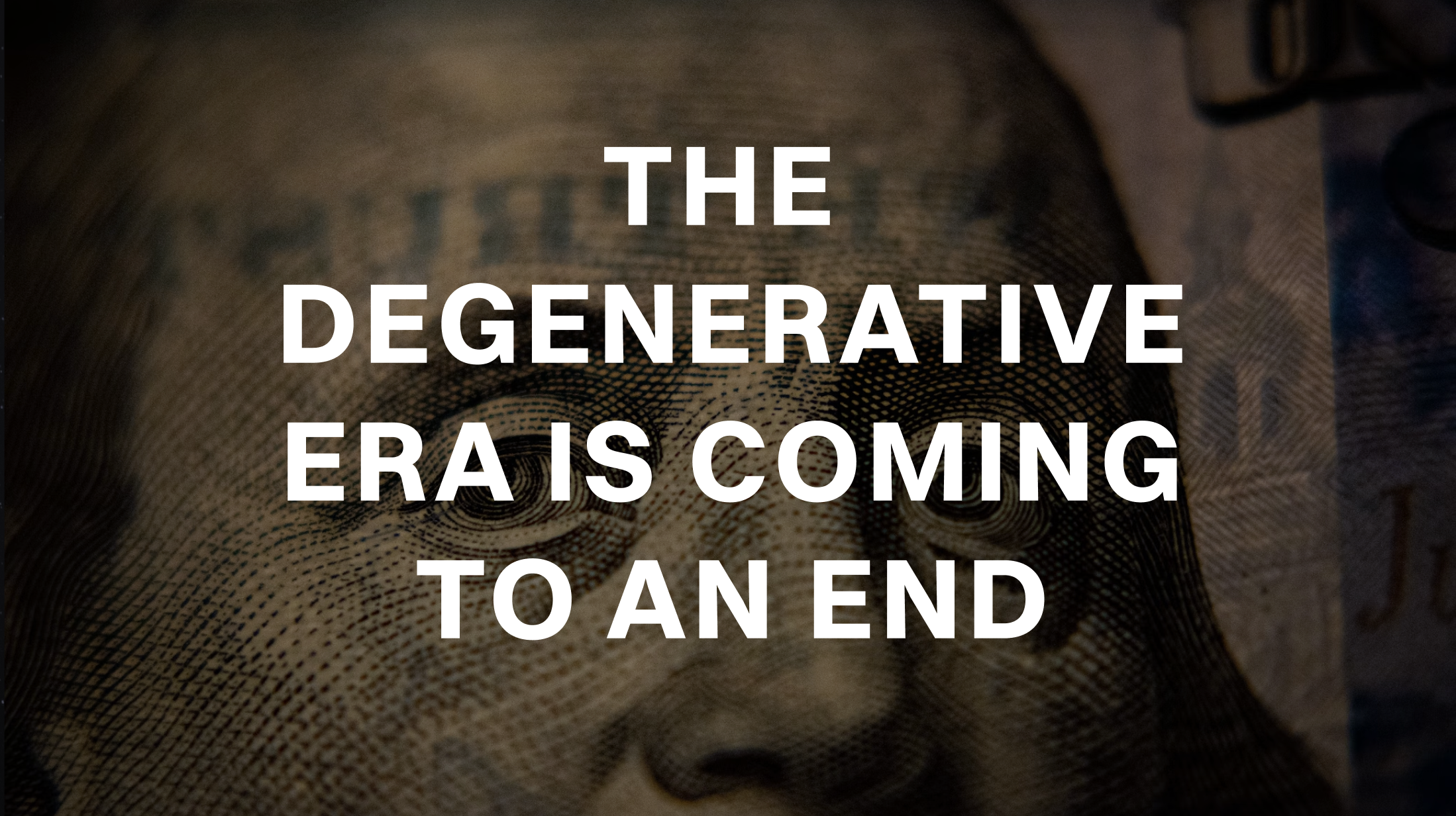

Or if you want to contribute to the discussion and join the Forum?
Or want to learn about other ways you can join or contribute to the ReFi Movement?

